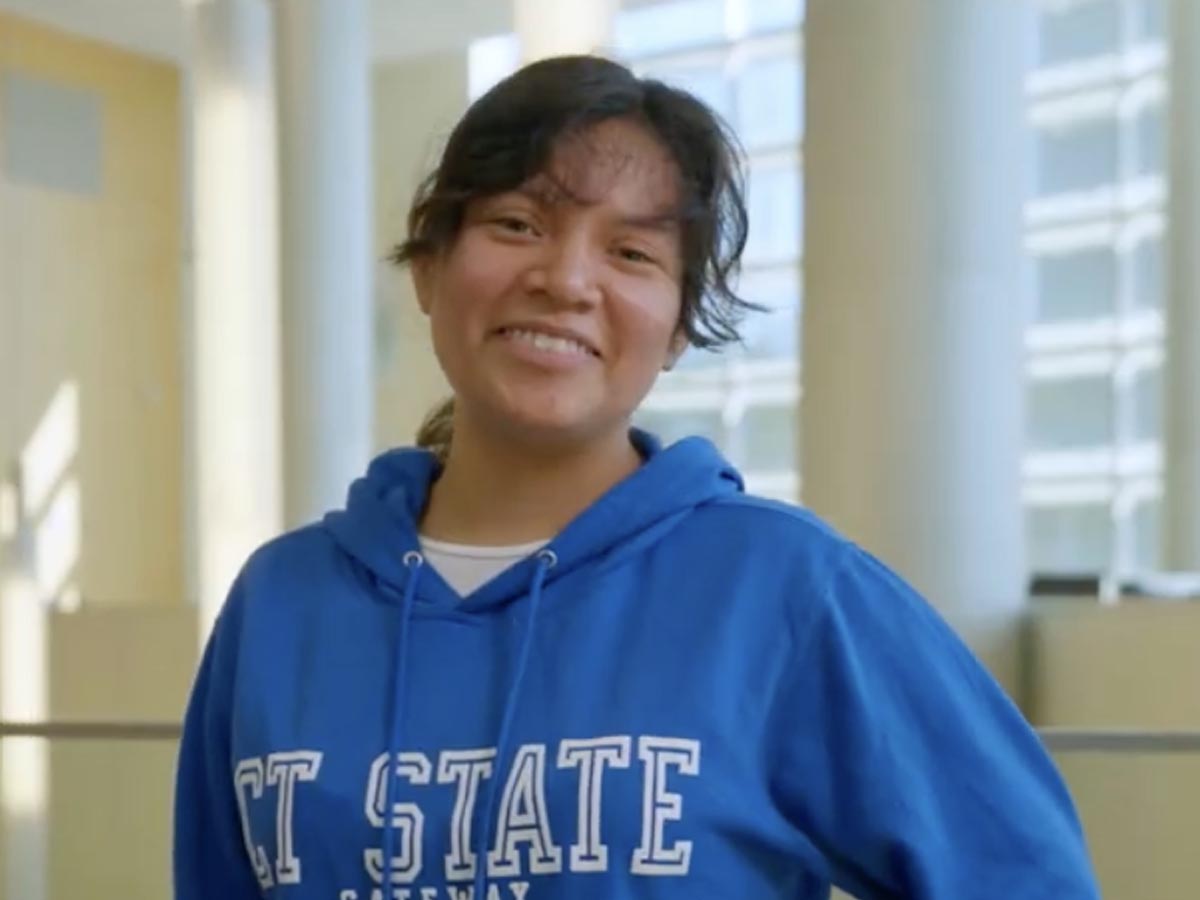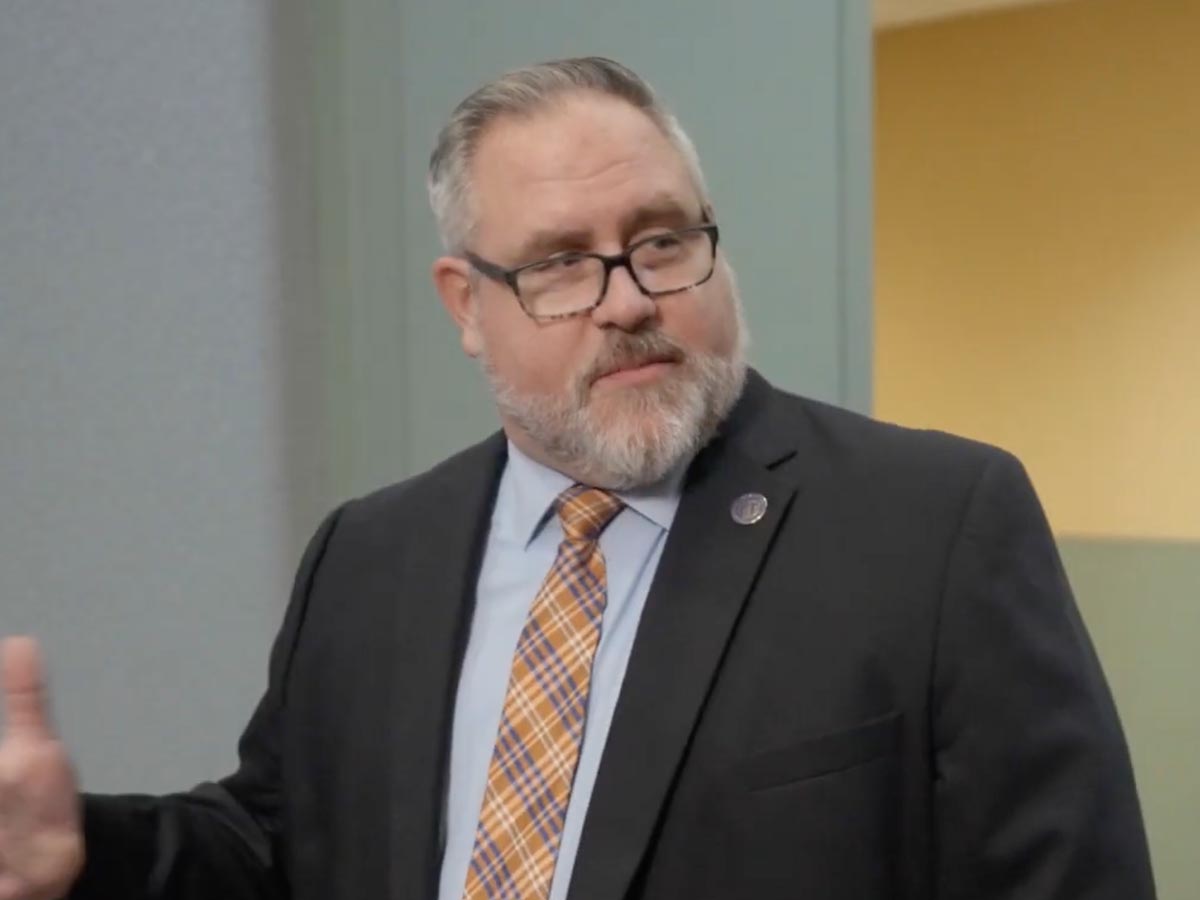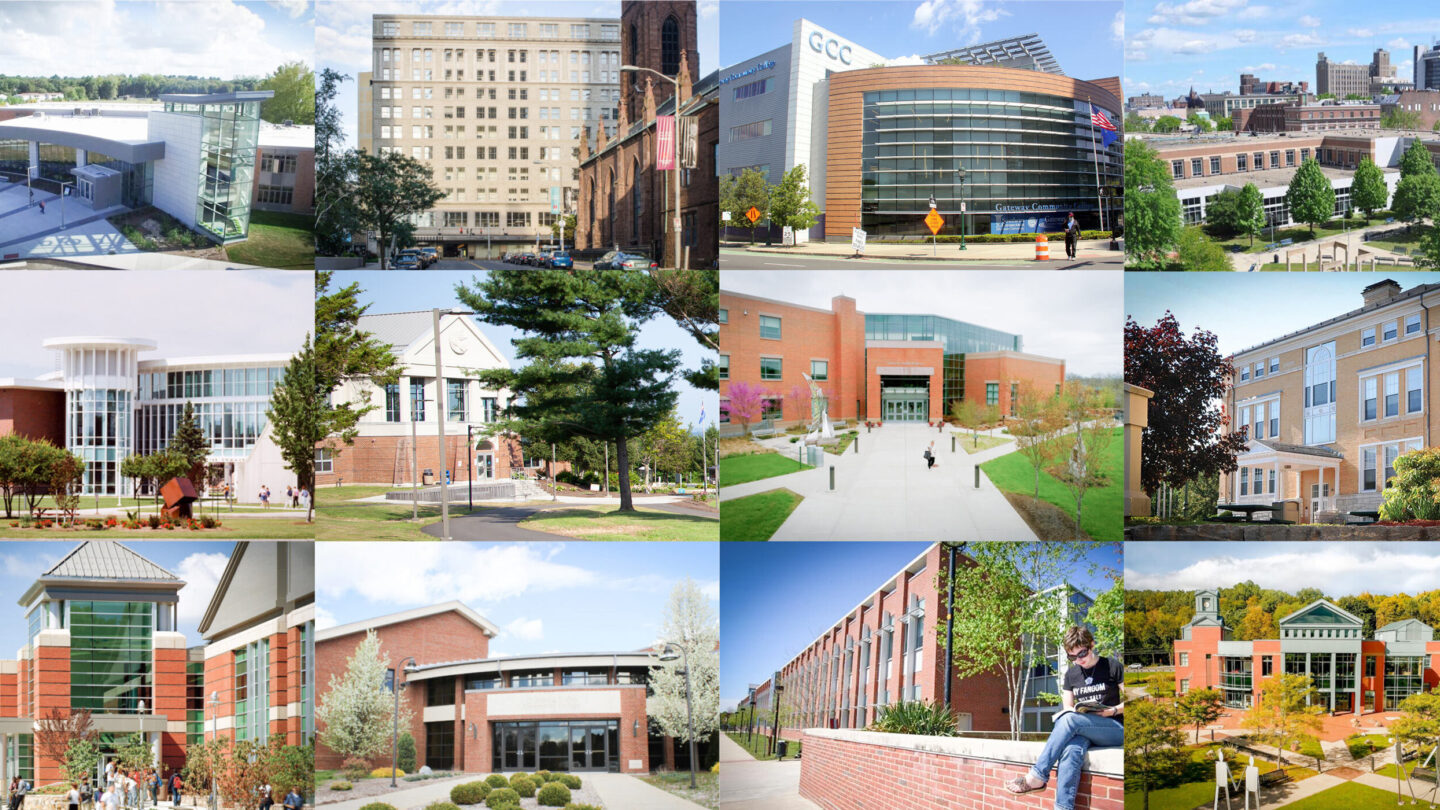Professional Licensure Disclosures
Below is a list of programs that are designed for professional licensure along with information to comply with 34 C.F.R. §668.43 and NC-SARA Policy Manual v.24.2 § 5.2.
Licensure is individual. Only licensure boards or agencies can determine whether a program has met requirements. These boards and agencies make that determination after someone graduates or completes the program and applies for a license. After all reasonable efforts, we have provided our best assessment of how our program matches up to educational requirements for the license. Connecticut State Community College cannot guarantee the ability to earn any professional license, in any field, in any state or territory.
Additional requirements. Completing a program is typically only one part of the professional licensure requirements. Most states require that individuals meet additional requirements to qualify for licensure, including but not limited to additional coursework and training, supervised clinical experiences, and successful passage of state or national exams. Other licensure requirements typically include, but are not limited to, fees, background checks, years of work experience, references, fingerprinting requirements, etc.
Potential changes in requirements. Licensure information is reviewed and updated on an annual basis. Licensure requirements are subject to changes at any time. While a program may originally meet the educational requirements for licensure, changes in requirements could impact the program's ability to meet new educational requirements. Students should periodically check with the state licensure board or agency in the state(s) they intend to work in to confirm licensure requirements.
NC-SARA provides links to many state licensing boards at https://www.nc-sara.org/professional-licensure-directory
School of Nursing, Allied Health and Human Services
-
Campuses: Capital, Naugatuck Valley
Program Website: Administrative Medical AssistantThe Administrative Medical Assistant program meets state/territory educational requirements for professional licensure in the following states/territories: Connecticut.
We have not made a determination if the Administrative Medical Assistant program meets state/territory educational requirements for professional licensure in any other state, any U.S. Territory, or the District of Columbia.
Contact information for each state’s medical assisting certification agency can be found via the National Healthcareer Association (NHA) website. You should contact the board or agency to try to determine whether the program meets requirements for licensure.
-
Campuses: Middlesex,
Program Website: Clinical Coding The Clinical Coding Certificate program meets state/territory educational requirements for professional licensure in the following states/territories: Connecticut.
We have not made a determination if the Clinical Coding Certificate program meets state/territory educational requirements for professional licensure in any other state, any U.S. Territory, or the District of Columbia.
Contact information for each state's medical coding certification agency can be found via the American Health Information Management Association (AHIMA) website. You should contact the board to try to determine whether the program meets requirements for licensure.
-
Campuses: Gateway
Program Website: Diagnostic Medical SonographyThe Diagnostic Medical Sonography program meets state/territory educational requirements for professional licensure in the following states/territories: Connecticut.
We have not made a determination if the Diagnostic Medical Sonography program meets state/territory educational requirements for professional licensure in any other state, any U.S. Territory, or the District of Columbia.
Contact information for each state’s medical imaging or sonography certification agency can be found via the American Registry for Diagnostic Medical Sonography (ARDMS) website and the American Registry of Radiologic Technologists (ARRT) website.
You should contact the board or agency to try to determine whether the program meets requirements for licensure or certification.
-
Campuses: Manchester, Tunxis
Program Website: Dental Assisting CertificateThe Dental Assisting Certificate program meets state educational requirements for professional licensure in the following states/territories: Connecticut.
We have not made a determination if the Dental Assisting Certificate program meets state/territory educational requirements for professional licensure in any other state, any U.S. Territory, or the District of Columbia.
Contact information for each state's dental assistant licensing board or certification agency can be found via the Dental Assisting National Board (DANB) website. You should contact the board to try to determine whether the program meets requirements for licensure.
-
Campuses: Tunxis
Program Website: Dental HygieneThe Dental Hygiene program meets state/territory educational requirements for professional licensure in the following states/territories: Connecticut.
We have not made a determination if the Dental Hygiene program meets state/territory educational requirements for professional licensure in any other state, any U.S. Territory, or the District of Columbia.
Contact information for each state’s dental hygiene board can be found via the American Dental Hygienists' Association (ADHA) website. You should contact the board to try to determine whether the program meets requirements for licensure.
-
Campuses: Asnuntuck
Program Website: Massage TherapyThe Massage Therapy program meets state/territory educational requirements for professional licensure in the following states/territories: Connecticut.
We have not made a determination if the Massage Therapy program meets state/territory educational requirements for professional licensure in any other state, any U.S. Territory, or the District of Columbia.
Contact information for each state’s massage therapy licensing board or certification agency can be found via the Federation of State Massage Therapy Boards (FSMTB) website. You should contact the board to try to determine whether the program meets requirements for licensure.
-
Campuses: Capital, Gateway, Housatonic, Manchester, Middlesex, Naugatuck Valley, Northwestern, Norwalk, Quinebaug Valley, Three Rivers, Tunxis
Program Website: Medical AssistingWashington is currently the only state that requires medical assistants to be certified. For more information, visit the Washington State Department of Health website.
-
Campuses: Quinebaug Valley
Program Website: Medical Laboratory TechnicianThe Medical Laboratory Technician program meets state/territory educational requirements for professional licensure in the following states/territories: Connecticut.
We have not made a determination if the Medical Laboratory Technician program meets state/territory educational requirements for professional licensure in any other state, any U.S. Territory, or the District of Columbia.
Contact information for each state’s clinical laboratory licensing board or certification agency can be found via the American Society for Clinical Pathology (ASCP) website. You should contact the board to try to determine whether the program meets requirements for licensure.
-
Campuses: Gateway
Program Website: Nuclear Medicine TechnologyThe Nuclear Medicine Technology program meets state/territory educational requirements for professional licensure in the following states/territories: Connecticut.
We have not made a determination if the Nuclear Medicine Technology program meets the state education requirements in any other state, any U.S. Territory, or the District of Columbia.
Contact information for each state’s nuclear medicine board or agency can be found on the Nuclear Medicine Technology Certification Board (NMTCB) website or the American Registry of Radiologic Technologists (ARRT) website. You should contact the board to try to determine whether the program meets requirements for licensure.
Information on the State of Connecticut Nuclear Medicine program licensure requirements can be found at this link: Nuclear Medicine Technologist (ct.gov).
-
Campuses: Gateway
Program Website: Nutrition and DieteticsThe Nutrition and Dietetics program meets state/territory educational requirements for professional licensure in the following states/territories: Connecticut.
We have not made a determination if the Nutrition and Dietetics program meets state/territory educational requirements for professional licensure in any other state, any U.S. Territory, or the District of Columbia.
Contact information for each state’s dietetics licensing board or certification agency can be found via the Commission on Dietetic Registration (CDR) website. You should contact the board to try to determine whether the program meets requirements for licensure.
-
Campuses: Manchester
Program Website: Occupational Therapy AssistantThe Occupational Therapy Assistant program meets state/territory educational requirements for professional licensure in the following states/territories: Connecticut.
We have not made a determination if the Occupational Therapy Assistant program meets state/territory educational requirements for professional licensure in any other state, any U.S. Territory, or the District of Columbia.
Contact information for each state’s occupational therapy board can be found via the National Board for Certification in Occupational Therapy (NBCOT) website. You should contact the board to try to determine whether the program meets requirements for licensure.
-
Campuses: Middlesex
Program Website: Ophthalmic Design and DispensingThe Ophthalmic Design & Dispensing program meets state/territory educational requirements for professional licensure in the following states/territories: Connecticut.
We have not made a determination if the Ophthalmic Design & Dispensing program meets state/territory educational requirements for professional licensure in any other state, any U.S. Territory, or the District of Columbia.
Contact information for each state’s optician licensing board or certification agency can be found via the American Board of Opticianry (ABO) website. You should contact the board to try to determine whether the program meets requirements for licensure.
-
Campuses: Middlesex, Northwestern
Program Website: Outpatient Medical Coding and AuditingThe Outpatient Medical Coding and Auditing program meets state/territory educational requirements for professional licensure in the following states/territories: Connecticut.
We have not made a determination if the Outpatient Medical Coding and Auditing program meets state/territory educational requirements for professional licensure in any other state, any U.S. Territory, or the District of Columbia.
Contact information for each state’s medical coding and auditing certification agency can be found via the American Academy of Professional Coders (AAPC) website. You should contact the board to try to determine whether the program meets requirements for licensure.
-
Campuses: Capital
Program Website: Paramedic StudiesThe Paramedic Studies program meets state/territory educational requirements for professional licensure in the following states/territories: Connecticut.
We have not made a determination if the Paramedic Studies program meets state/territory educational requirements for professional licensure in any other state, any U.S. Territory, or the District of Columbia.
Contact information for each state’s paramedic board can be found via the National Registry of Emergency Medical Technicians (NREMT) website. You should contact the board to try to determine whether the program meets requirements for licensure.
-
Campuses: Naugatuck Valley, Norwalk
Program Website: Physical Therapist AssistantThe Physical Therapist Assistant program meets state/territory educational requirements for professional licensure in the following states/territories: Connecticut.
We have not made a determination if the Physical Therapist Assistant program meets state/territory educational requirements for professional licensure in any other state, any U.S. Territory, or the District of Columbia.
Contact information for each state’s physical therapy licensing board or certification agency can be found via the Federation of State Boards of Physical Therapy (FSBPT) website. You should contact the board to try to determine whether the program meets requirements for licensure.
-
Campuses: Quinebaug Valley
Program Website: Practical NursingThe Practical Nursing program meets state/territory educational requirements for professional licensure in the following states/territories: Connecticut.
We have not made a determination if the Practical Nursing program meets state/territory educational requirements for professional licensure in any other state, any U.S. Territory, or the District of Columbia.
Contact information for each state’s nursing board can be found on the National Council of State Boards of Nursing (NCSBN) website. You should contact the board to try to determine whether the program meets requirements for licensure.
-
Campuses: Gateway, Manchester
Program Website: Radiation TherapyThe Radiation Therapy program meets state/territory educational requirements for professional licensure in the following states/territories: Connecticut.
We have not made a determination if the Radiation Therapy program meets state/territory educational requirements for professional licensure in any other state, any U.S. Territory, or the District of Columbia.
Contact information for each state’s radiologic technology licensing board or certification agency can be found via the American Registry of Radiologic Technologists (ARRT) website. You should contact the board to try to determine whether the program meets requirements for licensure.
-
Campuses: Capital, Gateway, Manchester, Middlesex, Naugatuck Valley
Program Website: RadiolographyThe Radiography program meets state/territory educational requirements for professional licensure in the following states/territories: Connecticut.
We have not made a determination if the Radiography program meets state/territory educational requirements for professional licensure in any other state, any U.S. Territory, or the District of Columbia.
Contact information for each state’s radiologic technology board or certification agency can be found via the American Registry of Radiologic Technologists (ARRT) website. You should contact the board to try to determine whether the program meets requirements for licensure.
-
Campuses: Capital, Gateway, Naugatuck Valley, Norwalk, Three Rivers
Program Website: Registered NursingThe Registered Nursing program meets state/territory educational requirements for professional licensure in the following states/territories: Connecticut.
We have not made a determination if the Registered Nursing program meets state/territory educational requirements for professional licensure in any other state, any U.S. Territory, or the District of Columbia.
Contact information for each state’s nursing board can be found on the National Council of State Boards of Nursing (NCSBN) website. You should contact the board to try to determine whether the program meets requirements for licensure.
-
Campuses: Manchester, Naugatuck Valley, Norwalk
Program Website: Respiratory CareThe Respiratory Care program meets state/territory educational requirements for professional licensure in the following states/territories: Connecticut.
We have not made a determination if the Respiratory Care program meets state/territory educational requirements for professional licensure in any other state, any U.S. Territory, or the District of Columbia.
Contact information for each state’s respiratory therapy board can be found via the American Association for Respiratory Care (AARC) website. You should contact the board to try to determine whether the program meets requirements for licensure.
-
Campuses: Gateway, Housatonic, Manchester
Program Website: Surgical TechnologyThe Surgical Technology program meets state/territory educational requirements for professional licensure in the following states/territories: Connecticut.
We have not made a determination if the Surgical Technology program meets state/territory educational requirements for professional licensure in any other state, any U.S. Territory, or the District of Columbia.
Contact information for each state’s nursing board can be found on the Association of Surgical Technologists website. You should contact the board to try to determine whether the program meets requirements for licensure.
-
Campuses: Manchester
Program Website: Therapeutic RecreationThe Therapeutic Recreation Certificate program meets state educational requirements for employment as a Therapeutic Recreation Director in chronic and convalescent nursing homes and rest homes with nursing supervision in Connecticut, as outlined by the Connecticut Department of Public Health.
We have not made a determination if the Therapeutic Recreation Certificate program meets educational requirements for professional licensure or certification in any other state, any U.S. Territory, or the District of Columbia.
Contact information for national certification can be found via the National Council for Therapeutic Recreation Certification (NCTRC) website. You should contact the appropriate board or agency to determine whether the program meets requirements for licensure or certification in your state or territory.
-
Campuses: Middlesex, Northwestern, Norwalk
Program Website: Veterinary TechnologyThe Veterinary Technology program meets state/territory educational requirements for professional licensure in the following states/territories: Connecticut.
We have not made a determination if the Veterinary Technology program meets state/territory educational requirements for professional licensure in any other state, any U.S. Territory, or the District of Columbia.
Contact information for each state’s veterinary board or certification agency can be found via the American Association of Veterinary State Boards (AAVSB) website. You should contact the board to try to determine whether the program meets requirements for licensure.
School of Science, Technology, Engineering and Mathematics
-
Campuses: Gateway, Naugatuck Valley
Program Website: Automotive TechnologyThe Automotive Technology: Comprehensive Automotive Repair and Service (CARS) program prepares students for national certification exams offered by the National Institute for Automotive Service Excellence (ASE), such as the C1 (Automobile Service Consultant) and P1 (Parts Specialist) exams.
We have not made a determination if the Automotive Technology: Comprehensive Automotive Repair and Service (CARS) program meets state/territory educational requirements for professional licensure in any state, any U.S. Territory, or the District of Columbia.
Contact information for ASE certification and testing can be found via the National Institute for Automotive Service Excellence (ASE) website. You should contact ASE to determine certification requirements.
-
Campuses: Gateway
Program Website: Environmental Science: Environmental Science and ToxicologyThe Environmental Science: Environmental Science and Toxicology program meets state/territory educational requirements for professional licensure in the following states/territories: Connecticut.
We have not made a determination if the Environmental Science: Environmental Science and Toxicology program meets state/territory educational requirements for professional licensure in any other state, any U.S. Territory, or the District of Columbia.
Contact information for each state's environmental professional licensing board or certification agency can be found via the American Geosciences Institute (AGI) website. You should contact the board to try to determine whether the program meets requirements for licensure.
-
Campuses: Three Rivers
Program Website: Clean Water Management CertificateThe Clean Water Management program meets state/territory educational requirements for professional licensure in the following states/territories: Connecticut.
We have not made a determination if the Clean Water Management program meets state/territory educational requirements for professional licensure in any other state, any U.S. Territory, or the District of Columbia.
Contact information for each state's wastewater treatment operator licensing board or certification agency can be found via the Association of Boards of Certification (ABC) website. You should contact the board to try to determine whether the program meets requirements for licensure.
-
Campuses: Capital, Norwalk
Program Website: Construction ManagementThe Construction Management Certificate program meets state/territory educational requirements for professional licensure in the following states/territories: Connecticut.
We have not made a determination if the Construction Management program meets state/territory educational requirements for professional licensure in any other state, any U.S. Territory, or the District of Columbia.
Contact information for each state's construction licensing board or certification agency can be found via the National Association of State Contractors Licensing Agencies (NASCLA) website. You should contact the board to try to determine whether the program meets requirements for licensure.
-
Campuses: Gateway
Program Website: FirefighterThe Firefighter program meets state/territory educational requirements for professional licensure in the following states/territories: Connecticut.
We have not made a determination if the Firefighter program meets state/territory educational requirements for professional licensure in any other state, any U.S. Territory, or the District of Columbia.
Contact information for each state's fire service certification agency can be found via the National Board on Fire Service Professional Qualifications (Pro Board) website. You should contact the board to try to determine whether the program meets requirements for licensure.
-
Campuses: Three Rivers
Program Website: Nuclear Engineering TechnologyThe Nuclear Engineering Technology program meets state/territory educational requirements for professional licensure in the following states/territories: Connecticut.
We have not made a determination if the Nuclear Engineering Technology program meets state/territory educational requirements for professional licensure in any other state, any U.S. Territory, or the District of Columbia.
Contact information for each state's nuclear engineering licensing board or certification agency can be found via the U.S. Nuclear Regulatory Commission (NRC) website. You should contact the board to try to determine whether the program meets requirements for licensure.
-
Campuses: Gateway
Program Website: Water ManagementThe Water Management program meets state educational requirements for individuals seeking certification as water treatment and distribution system operators in Connecticut. Successful completion of the program provides the necessary education requirements to take the Connecticut Department of Public Health's (CT DPH) highest-class water industry certification examinations.
We have not made a determination if the Water Management Certificate program meets state/territory educational requirements for professional licensure in any other state, any U.S. Territory, or the District of Columbia.
Contact information for each state's water operator licensing board or certification agency can be found via the Association of Boards of Certification (ABC) website. You should contact the board to try to determine whether the program meets requirements for licensure.
School of Business and Professional Studies
Campuses: Gateway, Manchester, Naugatuck Valley, Norwalk
Program Website: Food Service Management
The Culinary Arts program prepares students for industry-recognized certifications including:
- ServSafe® Food Protection Manager
- TIPS® (Training for Intervention Procedures)
The Culinary Arts program meets state/territory educational requirements for professional licensure in the following states/territories: Connecticut.
We have not made a determination if the Culinary Arts program meets state/territory educational requirements for professional licensure in any state, any U.S. Territory, or the District of Columbia.
Contact information for certification agencies can be found on the following websites:
You should contact these organizations to determine the requirements for certification.
Workforce Development and Continuing Education: Nursing, Allied Health and Human Services Programs
-
Program Website: Administrative Medical Assistant
Campuses: Varies by term and location – check program website for availability- Program Type: Certificate: Non-Credit
- Preparation: Prepares students for administrative roles in healthcare settings and for optional national certification exams such as the NHA Certified Medical Administrative Assistant (CMAA).
- Offered Through: Workforce Development and Continuing Education (WDCE)
Licensure Disclosure:
The Administrative Medical Assistant program prepares students for employment and optional national certification in Connecticut.We have not made a determination if the program meets educational or certification requirements in any other state, U.S. territory, or the District of Columbia.
Advisement:
While licensure is not typically required for administrative medical assistants, some employers or states may require or prefer certification. Students planning to work outside Connecticut should consult state regulations and credentialing agencies.More information is available at:
- National Health Career Association (NHA): https://www.nhanow.com
-
Program Website: Basic Life Support
Campuses: Asnuntuck, Capital, Gateway, Middlesex, Naugatuck Valley, Northwestern, Norwalk, Quinebaug Valley, Three Rivers, TunxisProgram Type: Certificate: Non-Credit
- Preparation: Prepares students to perform CPR and basic emergency cardiovascular care. Fulfills American Heart Association (AHA) Basic Life Support certification requirements.
- Offered Through: Workforce Development and Continuing Education (WDCE)
Licensure Disclosure:
The Basic Life Support (BLS) program provides nationally recognized certification through the AHA and meets employer training requirements in Connecticut.We have not made a determination if the program meets certification requirements in any other state, U.S. territory, or the District of Columbia, though AHA certification is generally recognized nationwide.
Advisement:
BLS certification is widely accepted across the United States; however, some states, institutions, or employers may have specific requirements. Students should verify that AHA certification meets their intended workplace or licensure standards.More information is available at:
- American Heart Association (AHA): https://www.heart.org
-
Program Website: Certified Nurse Aide (CNA)
Campuses: Capital, Gateway, Housatonic, Manchester, Middlesex, Naugatuck Valley, Northwestern, Norwalk, Quinebaug Valley, Three Rivers, Tunxis
- Program Type: Certificate
- Preparation: Prepares students for the Connecticut CNA licensure exam.
- Offered Through: Workforce Development and Continuing Education (WDCE)
Licensure Disclosure:
The Certified Nurse Aide (CNA) program meets state/territory educational requirements for professional licensure in the following state: Connecticut.We have not made a determination if the CNA program meets educational requirements for professional licensure in any other state, U.S. territory, or the District of Columbia.
-
Program Website: Community Health Worker – CT State
Campuses: Capital, Gateway, Housatonic, Three Rivers- Program Type: Certificate: Non-Credit
- Preparation: Prepares students for roles as community health workers and supports eligibility for voluntary certification through the Connecticut Department of Public Health (DPH).
- Offered Through: Workforce Development and Continuing Education (WDCE)
Licensure Disclosure:
The Community Health Worker program supports educational requirements for voluntary certification in Connecticut through the Connecticut DPH.We have not made a determination if the program meets educational or certification requirements in any other state, U.S. territory, or the District of Columbia.
Advisement:
Certification and scope of practice for community health workers vary by state. Some states require state-recognized training or credentialing. Students seeking employment outside Connecticut should consult their state’s department of public health or licensing board.More information is available at:
- Connecticut DPH Community Health Worker Certification: https://portal.ct.gov/DPH
-
Program Website: Cosmetology/Hairdressing
Campuses: Asnuntuck- Program Type: Certificate or Diploma (varies by site)
- Preparation: Provides the required hours and training to qualify for the Connecticut Cosmetology Licensure Exam administered by PSI.
- Offered Through: Workforce Development and Continuing Education (WDCE)
Licensure Disclosure:
The Cosmetology program meets the educational requirements for licensure in Connecticut.We have not made a determination if the program meets licensure requirements in any other state, U.S. territory, or the District of Columbia.
Advisement:
Cosmetology licensure is regulated by state boards. Students seeking licensure in other states must review state-specific hour and exam requirements, which may differ from Connecticut’s. -
Program Website: Dental Assistant
Campuses: Asnuntuck, Gateway, Norwalk, Three Rivers- Program Type: Certificate: Non-Credit
- Preparation: Prepares students for entry-level employment as a dental assistant. May support eligibility for DANB (Dental Assisting National Board) exams depending on state requirements.
- Offered Through: Workforce Development and Continuing Education (WDCE)
Licensure Disclosure:
The Dental Assistant program does not meet educational requirements for licensure in any state by default. Connecticut does not require licensure for dental assistants, but certain functions (like radiography) may require additional certification.We have not made a determination if the program meets educational or certification requirements in any other state, U.S. territory, or the District of Columbia.
Advisement:
Licensure, certification, and allowable duties for dental assistants vary by state. Students intending to practice outside of Connecticut should review their state’s dental board requirements.For more information, visit:
- Dental Assisting National Board (DANB): https://www.danb.org
-
Program Website: EKG Technician
Campuses: Asnuntuck, Capital, Gateway, Middlesex, Naugatuck Valley, Norwalk, Three Rivers, Tunxis
- Program Type: Certificate
- Preparation: Prepares students for national certification exams such as the National Healthcareer Association (NHA) Certified EKG Technician (CET) exam.
- Offered Through: Workforce Development and Continuing Education (WDCE)
Licensure Disclosure:
The EKG Technician program prepares students for national certification and meets the educational requirements for certification in Connecticut.We have not made a determination if the program meets educational or certification requirements in any other state, U.S. territory, or the District of Columbia.
Advisement:
Licensing and certification requirements for EKG Technicians vary by state. Students seeking certification or licensure outside of Connecticut should contact the appropriate credentialing or regulatory agency in their state.Information on national certification can be found at:
- National Healthcareer Association (NHA): https://www.nhanow.com
-
Program Website: Emergency Medical Technician
Campuses: Asnuntuck, Manchester, Middlesex, Northwestern, Norwalk, Quinebaug Valley, Tunxis- Program Type: Certificate: Non-Credit
- Preparation: Prepares students for the National Registry of Emergency Medical Technicians (NREMT) certification exam and Connecticut EMT licensure.
- Offered Through: Workforce Development and Continuing Education (WDCE)
Licensure Disclosure:
The Emergency Medical Technician (EMT) program meets the educational requirements for EMT licensure in Connecticut.We have not made a determination if the program meets educational or licensure requirements in any other state, U.S. territory, or the District of Columbia.
Advisement:
Licensing requirements for EMTs vary by state. Many states utilize the NREMT exam as part of their licensure process. Students intending to work outside of Connecticut should contact their state’s EMS authority to verify eligibility.More information is available at:
- National Registry of Emergency Medical Technicians (NREMT): https://www.nremt.org
-
Program Website: Esthetician
Campuses: Three Rivers, Asnuntuck- Program Type: Certificate: Non-Credit
- Preparation: Provides the state-mandated training hours and curriculum required to sit for the Connecticut Esthetician License exam.
- Offered Through: Workforce Development and Continuing Education (WDCE)
Licensure Disclosure:
The Esthetician program meets the educational requirements for licensure in Connecticut.We have not made a determination if the program meets licensure requirements in any other state, U.S. territory, or the District of Columbia.
Advisement:
Licensure for estheticians is regulated by state boards of cosmetology. Students seeking licensure outside Connecticut should consult their state’s licensing agency for specific education and exam requirements. -
Program Website: Medical Interpreter
Campuses: Gateway, Asnuntuck- Program Type: Certificate: Non-Credit
- Preparation: Prepares bilingual students to serve as interpreters in medical and healthcare settings. May help meet eligibility requirements for national certifications such as the Certified Medical Interpreter (CMI) through the National Board of Certification for Medical Interpreters or Certified Healthcare Interpreter (CHI) through the Certification Commission for Healthcare Interpreters.
- Offered Through: Workforce Development and Continuing Education (WDCE)
Licensure Disclosure:
The Medical Interpreter program does not lead to a state license in Connecticut, as Connecticut does not license medical interpreters. However, national certification is often preferred or required by employers.We have not made a determination if the program meets educational or certification requirements in any other state, U.S. territory, or the District of Columbia.
Advisement:
Certification and employment requirements vary by employer and state. Students planning to work as medical interpreters outside Connecticut should verify requirements with local healthcare systems and national certifying bodies.More information:
- National Board of Certification for Medical Interpreters (NBCMI): https://www.certifiedmedicalinterpreters.org
- Certification Commission for Healthcare Interpreters (CCHI): https://www.cchicertification.org
-
Program Website: Medical Office Specialist
Campuses: Gateway
- Program Type: Certificate: Non-Credit
- Preparation: Prepares students for administrative roles in healthcare environments such as medical offices, clinics, and hospitals. Training may support eligibility for national certifications such as the Certified Medical Administrative Assistant (CMAA) from the National Healthcareer Association (NHA).
- Offered Through: Workforce Development and Continuing Education (WDCE)
Licensure Disclosure:
The Medical Office Assistant program does not lead to licensure in Connecticut, as medical office assistants are not a licensed profession. However, national certification may be required or preferred by employers.We have not made a determination if the program meets certification requirements in any other state, U.S. territory, or the District of Columbia.
Advisement:
Students interested in working outside Connecticut or pursuing national certification should consult the specific requirements of their employer or credentialing body.More information is available at:
- National Healthcareer Association (NHA): https://www.nhanow.com
-
Program Website: Nail Technician
Campuses: Asnuntuck
- Program Type: Certificate: Non-Credit
- Preparation: Prepares students with the required education to take the Connecticut Nail Technician Licensing Exam through the Connecticut Department of Public Health (DPH).
- Offered Through: Workforce Development and Continuing Education (WDCE)
Licensure Disclosure:
The Nail Technician program meets the educational requirements for licensure in Connecticut.We have not made a determination if the program meets licensure requirements in any other state, U.S. territory, or the District of Columbia.
Advisement:
Licensure requirements vary widely by state. Students planning to work as a licensed nail technician outside Connecticut should contact their state’s cosmetology licensing board. -
Program Website: Ophthalmic Assistant
Campuses: Asnuntuck, Housatonic- Program Type: Certificate: Non-Credit
- Preparation: Prepares students for entry-level employment assisting ophthalmologists and optometrists; may help prepare for national certifications such as the JCAHPO Certified Ophthalmic Assistant (COA) exam.
- Offered Through: Workforce Development and Continuing Education (WDCE)
Licensure Disclosure:
The Ophthalmic Assistant program does not meet specific licensure requirements in any state by default. Connecticut does not require licensure for ophthalmic assistants, but employers may prefer or require national certification.We have not made a determination if the program meets educational or certification requirements in any other state, U.S. territory, or the District of Columbia.
Advisement:
Licensing and certification requirements for ophthalmic assistants vary by state and employer. Students seeking to work outside Connecticut should verify requirements with their state’s health board or national credentialing organizations.More information is available at:
- International Joint Commission on Allied Health Personnel in Ophthalmology (IJCAHPO): https://www.jcahpo.org
-
Program Website: Patient Care Technician
Campuses: Asnuntuck, Capital, Gateway, Housatonic, Middlesex, Tunxis- Program Type: Certificate: Non-Credit
- Preparation: Prepares students for entry-level employment in healthcare settings and for national certification exams such as the National Healthcareer Association (NHA) Certified Patient Care Technician/Assistant (CPCT/A).
- Offered Through: Workforce Development and Continuing Education (WDCE)
Licensure Disclosure:
The Patient Care Technician program prepares students for national certification and supports employment in Connecticut healthcare settings.We have not made a determination if the program meets educational or certification requirements in any other state, U.S. territory, or the District of Columbia.
Advisement:
Certification and scope of practice for Patient Care Technicians vary by state and employer. Students planning to work outside of Connecticut should check their state’s regulations or contact national certifying bodies.More information is available at:
- National Healthcareer Association (NHA): https://www.nhanow.com
-
Program Website: Pharmacy Technician Certificate
Campuses: Asnuntuck, Capital, Gateway, Housatonic, Manchester, Middlesex, Naugatuck Valley, Northwestern, Quinebaug Valley, Three Rivers, Tunxis- Program Type: Certificate: Non-Credit
- Preparation: Prepares students for national certification exams such as the Pharmacy Technician Certification Board (PTCB) exam and for pharmacy technician registration with the Connecticut Department of Consumer Protection.
- Offered Through: Workforce Development and Continuing Education (WDCE)
Licensure Disclosure:
The Pharmacy Technician Certificate program meets educational requirements for certification and registration in Connecticut.We have not made a determination if the program meets educational or certification requirements in any other state, U.S. territory, or the District of Columbia.
Advisement:
Pharmacy technician licensing and certification requirements vary by state. Most states require certification through PTCB. Students planning to work outside of Connecticut should verify requirements with their state’s board of pharmacy.More information is available at:
- Pharmacy Technician Certification Board (PTCB): https://www.ptcb.org
-
Program Website: Personal Trainer
Campuses: Asnuntuck, Tunxis, Naugatuck Valley- Program Type: Certificate: Non-Credit
- Preparation: Prepares students for national certification exams such as NASM Certified Personal Trainer (CPT), ACE Personal Trainer Certification, or other NCCA-accredited credentials.
- Offered Through: Workforce Development and Continuing Education (WDCE)
Licensure Disclosure:
The Personal Trainer program does not lead to a state license in Connecticut, as personal training is not a licensed profession in the state. However, employers typically require or prefer national certification.We have not made a determination if the program meets certification or employment requirements in any other state, U.S. territory, or the District of Columbia.
Advisement:
Students should research which national certification (e.g., NASM, ACE, ISSA, ACSM) aligns best with their career goals. Requirements may vary by employer, insurer, or gym chain.More information is available at:
- National Academy of Sports Medicine (NASM): https://www.nasm.org
- American Council on Exercise (ACE): https://www.acefitness.org
-
Program Website: Phlebotomy Technician Certificate
Campuses: Asnuntuck, Capital, Gateway, Housatonic, Manchester, Middlesex, Naugatuck Valley, Northwestern, Norwalk, Quinebaug Valley, Three Rivers, Tunxis- Program Type: Certificate: Non-Credit
- Preparation: Prepares students for entry-level phlebotomy roles in healthcare settings and to take national certification exams such as the NHA Certified Phlebotomy Technician (CPT) or ASCP Phlebotomy Technician (PBT) exam.
- Offered Through: Workforce Development and Continuing Education (WDCE)
Licensure Disclosure:
The Phlebotomy Technician Certificate program meets the educational requirements for certification in Connecticut.We have not made a determination if the program meets educational or certification requirements in any other state, U.S. territory, or the District of Columbia.
Advisement:
Licensing and certification requirements for phlebotomists vary by state. Some states require national certification or additional clinical experience. Students intending to work outside Connecticut should contact their state’s health department or credentialing agency.More information is available at:
- National Healthcareer Association (NHA): https://www.nhanow.com
- American Society for Clinical Pathology (ASCP): https://www.ascp.org
-
Program Website: Physical Therapy Aide
Campuses: Norwalk- Program Type: Certificate: Non-Credit
- Preparation: Prepares students to assist physical therapists and physical therapist assistants in non-clinical tasks such as patient transport, equipment setup, and clerical work.
- Offered Through: Workforce Development and Continuing Education (WDCE)
Licensure Disclosure:
The Physical Therapy Aide program does not lead to licensure, as licensure is not required for physical therapy aides in Connecticut.We have not made a determination if the program meets licensure or employment requirements in any other state, U.S. territory, or the District of Columbia.
Advisement:
While aides are unlicensed support roles, regulations may vary by employer or state. Students should confirm employment qualifications with their intended employer or state's board of physical therapy. -
Program Website: Professional Medical Coding and Billing
Campuses: Varies by term and location – check program website for availability- Program Type: Certificate: Non-Credit
- Preparation: Prepares students for national certification exams such as the AAPC Certified Professional Coder (CPC) or AHIMA Certified Coding Associate (CCA).
- Offered Through: Workforce Development and Continuing Education (WDCE)
Licensure Disclosure:
The Professional Medical Coding and Billing program prepares students for national certification and supports employment eligibility in Connecticut.We have not made a determination if the program meets educational or certification requirements in any other state, U.S. territory, or the District of Columbia.
Advisement:
Certification requirements for medical coders and billers vary by employer and state. Students seeking employment outside Connecticut should review local employer preferences and state credentialing guidelines.More information is available at:
- AAPC (American Academy of Professional Coders): https://www.aapc.com
- AHIMA (American Health Information Management Association): https://www.ahima.org
-
Program Website: Veterinary Assistant – CT State
Campuses: Asnuntuck, Middlesex, Naugatuck Valley, Norwalk, Quinebaug Valley, Three Rivers, Tunxis- Program Type: Certificate: Non-Credit
- Preparation: Prepares students for entry-level employment in veterinary clinics or animal hospitals; may support eligibility for voluntary certification through programs such as NAVTA Approved Veterinary Assistant (AVA).
- Offered Through: Workforce Development and Continuing Education (WDCE)
Licensure Disclosure:
The Veterinary Assistant program does not meet specific state licensure requirements, as licensure is not required to work as a veterinary assistant in Connecticut.We have not made a determination if the program meets educational or certification requirements in any other state, U.S. territory, or the District of Columbia.
Advisement:
Veterinary assistants are generally not licensed professionals, but some states or employers may require specific certifications or training. Students intending to work outside Connecticut should check with the state’s veterinary medical board or national credentialing agencies.More information is available at:
- National Association of Veterinary Technicians in America (NAVTA): https://www.navta.net
Workforce Development and Continuing Education: STEM Programs
-
Program Website: Eversource Lineworker Program
Campuses: Housatonic, Capital
- Program Type: Certificate: Non-Credit
- Preparation: Trains students for utility lineworker roles, including pole climbing, electrical theory, and safety practices aligned with utility industry standards.
- Offered Through: Workforce Development and Continuing Education (WDCE)
Licensure Disclosure:
The Eversource Lineworker Certificate program does not lead to a state license, but provides training required by Eversource and other utility employers.We have not made a determination if the program meets employment or safety requirements in any other state, U.S. territory, or the District of Columbia.
Advisement:
Students seeking utility work outside Connecticut should confirm employer-specific training or certification requirements. -
Program Website: CNC Machining Technology 1-2-3
Campuses: Housatonic- Program Type: Certificate: Non-Credit
- Preparation: Prepares students for entry- to advanced-level roles in Computer Numerical Control (CNC) machining. May align with NIMS (National Institute for Metalworking Skills) certifications.
- Offered Through: Workforce Development and Continuing Education (WDCE)
Licensure Disclosure:
CNC Machining programs do not require licensure in Connecticut. May support national credentials or manufacturing employment.We have not made a determination if training meets credentialing standards in other states or territories.
Advisement:
Students should review employer expectations and national standards (e.g., NIMS) for machinist certifications.More information:
-
Program Website: Welding
Campuses: Naugatuck Valley- Program Type: Certificate: Non-Credit
- Preparation: Trains students in various welding processes (e.g., GMAW, GTAW, SMAW, FCAW) and may prepare for certifications such as AWS D1.1 Structural Welding.
- Offered Through: Workforce Development and Continuing Education (WDCE)
Licensure Disclosure:
Welding programs do not lead to licensure, but may prepare students for national certifications recognized by the American Welding Society (AWS).We have not made a determination if the program meets certification requirements in any other state, U.S. territory, or the District of Columbia.
Advisement:
Students should pursue AWS or employer-specified certifications and confirm any location-specific standards.
Workforce Development and Continuing Education: Business and Professional Study Programs
-
Program Website: Bookkeeper Certificate
Campuses: Gateway, Naugatuck Valley, Norwalk- Program Type: Certificate: Non-Credit
- Preparation: Prepares students for entry-level bookkeeping roles and supports preparation for voluntary certification such as the Certified Bookkeeper (CB) through the American Institute of Professional Bookkeepers (AIPB) or Fundamental Payroll Certification (FPC) through the American Payroll Association (APA).
- Offered Through: Workforce Development and Continuing Education (WDCE)
Licensure Disclosure:
The Bookkeeping Certificate program does not lead to licensure in Connecticut, as licensure is not required to work as a bookkeeper in the state.We have not made a determination if the program meets educational or certification requirements in any other state, U.S. territory, or the District of Columbia.
Advisement:
Licensure is generally not required for bookkeeping; however, voluntary certifications may enhance employment opportunities. Students interested in national certification should consult relevant credentialing organizations.More information is available at:
- American Institute of Professional Bookkeepers (AIPB): https://www.aipb.org
- American Payroll Association (APA): https://www.americanpayroll.org
-
Campuses: Gateway
- Program Type: Certificate: Non-Credit
- Preparation: Prepares students for entry-level or upskilling roles in business analysis and may support eligibility for professional certifications such as the Entry Certificate in Business Analysis™ (ECBA™) through the International Institute of Business Analysis (IIBA).
- Offered Through: Workforce Development and Continuing Education (WDCE)
Licensure Disclosure:
The Business Analyst Certificate program does not lead to state licensure, as licensure is not required to work as a business analyst in Connecticut.We have not made a determination if the program meets educational or certification requirements in any other state, U.S. territory, or the District of Columbia.
Advisement:
Business analyst roles typically do not require licensure, but industry-recognized certifications are often preferred by employers. Students interested in working outside Connecticut or seeking certification should consult relevant credentialing bodies.More information is available at:
- International Institute of Business Analysis (IIBA): https://www.iiba.org
-
Program Website: Boating
Campuses: Manchester, Norwalk- Program Type: Certificate: Non-Credit
- Preparation: Prepares students to earn the Connecticut Safe Boating Certificate (SBC) and Personal Watercraft (PWC) Endorsement, required for operating recreational boats and jet skis in Connecticut.
- Offered Through: Workforce Development and Continuing Education (WDCE)
Licensure Disclosure:
This program meets Connecticut’s legal requirements for recreational boating and PWC operation certification.We have not made a determination if the program meets boating certification standards in any other state, U.S. territory, or the District of Columbia.
Advisement:
Boating safety requirements vary by state. Students should consult their state’s environmental or maritime authority to confirm certificate transferability.More information:
-
Program Website: CT Motorcycle Training Program
Campuses: Gateway, Manchester, Naugatuck Valley, Quinebaug Valley, Tunxis
- Program Type: Certificate: Non-Credit
- Preparation: Provides training required to waive the on-cycle skills test for a Class M motorcycle endorsement in Connecticut.
- Offered Through: Workforce Development and Continuing Education (WDCE)
Licensure Disclosure:
The CT Motorcycle Training Program meets Connecticut’s rider education requirements for motorcycle endorsement.We have not made a determination if the program meets motorcycle licensing standards in any other state, U.S. territory, or the District of Columbia.
Advisement:
Motorcycle licensing requirements vary by state. Students planning to ride outside Connecticut should check with their state's DMV or equivalent agency.More information:
-
Program Website: Hospitality and Tourism
Campuses: Gateway- Program Type: Certificate: Non-Credit
- Preparation: Prepares students for entry-level roles in the hospitality, tourism, and customer service industries. May support industry-recognized training such as ServSafe or other sector-specific certifications.
- Offered Through: Workforce Development and Continuing Education (WDCE)
Licensure Disclosure:
The Hospitality and Tourism Certificate program does not lead to state licensure, as licensure is not required to work in most hospitality and tourism roles in Connecticut.We have not made a determination if the program meets educational or certification requirements in any other state, U.S. territory, or the District of Columbia.
Advisement:
While licensure is not typically required, some employers may require certifications like ServSafe® for food safety or customer service credentials. Students should consult industry expectations and credentialing organizations if working outside of Connecticut.More information is available at:
- ServSafe (National Restaurant Association): https://www.servsafe.com
Here are the NC-SARA professional licensure disclosures for the four requested hospitality-related programs, using your standard format.
-
Program Website: Paraeducator Exam Prep
Campuses: Middlesex, Norwak
- Program Type: Certificate: Non-Credit
- Preparation: Prepares students for support roles in K–12 classrooms, assisting certified teachers with instruction, classroom management, and student services. May help meet district-specific training requirements for employment as a paraeducator.
- Offered Through: Workforce Development and Continuing Education (WDCE)
Licensure Disclosure:
The Paraeducator Certificate program does not lead to state licensure, as paraeducators in Connecticut do not require a professional license but may need to meet local district qualifications (e.g., college credits or testing such as ParaPro).We have not made a determination if the program meets employment requirements in any other state, U.S. territory, or the District of Columbia.
Advisement:
School districts vary in their requirements for hiring paraeducators. Students planning to work outside Connecticut should consult local Board of Education offices or State Departments of Education.More information:
-
Program Website: Professional Bartending Certification
Campuses: Gateway, Naugatuck Valley, Middlesex, Norwalk, Tunxis- Program Type: Certificate: Non-Credit
- Preparation: Prepares students for work in bars and restaurants, including training in mixology, responsible alcohol service, and state alcohol laws.
- Offered Through: Workforce Development and Continuing Education (WDCE)
Licensure Disclosure:
The Professional Bartending program does not lead to licensure in Connecticut. However, some employers may require alcohol service training or certification (e.g., TIPS, ServSafe Alcohol®).We have not made a determination if the program meets training or certification requirements in any other state, U.S. territory, or the District of Columbia.
Advisement:
Alcohol server training may be required or recommended depending on state law or employer policy. Students should verify local legal requirements for bartenders and alcohol service. -
Campuses: Gateway
- Program Type: Certificate: Non-Credit
- Preparation: Prepares students for careers in restaurant and hospitality service, with training in food handling, safety, and customer service practices. May include preparation for food safety certification (e.g., ServSafe®).
- Offered Through: Workforce Development and Continuing Education (WDCE)
Licensure Disclosure:
The Professional Food & Beverage Certificate program does not lead to a state license, but may include training that fulfills food safety certification requirements such as ServSafe® in Connecticut.We have not made a determination if the program meets educational or certification requirements in any other state, U.S. territory, or the District of Columbia.
Advisement:
Many food service employers require food safety certification. Students seeking to work outside Connecticut should consult local health department requirements or food handler credentialing agencies. -
Program Website: Real Estate Principles and Practices
Campuses: Asnuntuck, Gateway, Manchester, Middlesex, Naugatuck Valley, Northwestern, Norwalk, Quinebaug Valley, Three Rivers, Tunxis- Program Type: Certificate: Non-Credit
- Preparation: Fulfills the mandatory 60-hour education requirement for eligibility to sit for the Connecticut Real Estate Salesperson Licensing Exam, administered by PSI under the oversight of the Connecticut Department of Consumer Protection.
- Offered Through: Workforce Development and Continuing Education (WDCE)
Licensure Disclosure:
The Real Estate Principles and Practices program meets the educational requirements for real estate licensure in Connecticut.We have not made a determination if the program meets licensure requirements in any other state, U.S. territory, or the District of Columbia.
Advisement:
Real estate licensure is state-specific. Students planning to practice outside of Connecticut should consult the licensing board in the intended state of employment.More information:
-
Program Website: CT Security Officer Certification
Campuses: Gateway, Middlesex, Naugatuck Valley, Norwalk, Tunxis- Program Type: Certificate: Non-Credit
- Preparation: Prepares students to meet the training requirements mandated by the State of Connecticut Department of Emergency Services and Public Protection (DESPP) for obtaining a Security Officer Identification (Guard Card).
- Offered Through: Workforce Development and Continuing Education (WDCE)
Licensure Disclosure:
The Security Guard program meets the educational and training requirements for security guard licensure in Connecticut, specifically the 8-hour security officer training course required for the Connecticut Guard Card.We have not made a determination if the program meets educational or licensure requirements in any other state, U.S. territory, or the District of Columbia.
Advisement:
Security guard licensure requirements vary by state. Students seeking employment as a security officer outside of Connecticut should contact their state’s licensing authority to verify training and registration requirements.More information is available at:
- Connecticut DESPP – Division of State Police - Special Licensing & Firearms Unit: https://portal.ct.gov/DESPP
-
Program Website: ServSafe Certification
Campuses: Varies by term and location – check program website for availability- Program Type: Certificate: Non-Credit
- Preparation: Provides training and exam prep for ServSafe® Food Protection Manager Certification, which is often required by restaurants and food establishments.
- Offered Through: Workforce Development and Continuing Education (WDCE)
Licensure Disclosure:
The ServSafe Certification program prepares students for the nationally recognized ServSafe® Food Protection Manager Certification, which meets food safety requirements in Connecticut.We have not made a determination if the training meets requirements in any other state, U.S. territory, or the District of Columbia, though ServSafe® is widely accepted.
Advisement:
Students planning to work in food service outside Connecticut should check their state or local health department to ensure ServSafe® is accepted. -
Campuses: Gateway
- Program Type: Certificate: Non-Credit
- Preparation: Focuses on managerial-level food safety, including ServSafe® Food Protection Manager training and certification exam.
- Offered Through: Workforce Development and Continuing Education (WDCE)
Licensure Disclosure:
The ServSafe Protection Management program meets Connecticut's food safety certification requirements for management-level food handlers.We have not made a determination if the program meets requirements in any other state, U.S. territory, or the District of Columbia.
Advisement:
The ServSafe® Food Protection Manager Certification is nationally recognized and accepted in most states, but students should check with local agencies to confirm acceptance.
- Hits: 19230




















